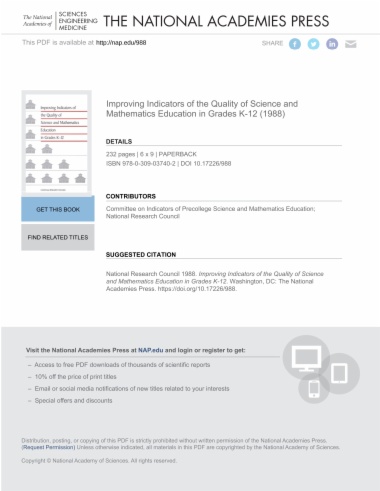This book presents a carefully developed monitoring system to track the progress of mathematics and science education, particularly the effects of ongoing efforts to improve students' scientific knowledge and mathematics competency. It describes an improved series of indicators to assess student learning, curriculum quality, teaching effectiveness, student behavior, and financial and leadership support for mathematics and science education. Of special interest is a critical review of current testing methods and their use in probing higher-order skills and evaluating educational quality.
- Cover
- Front Matter
- 1 Summary and Recommendations
- 2 Indicators of Science and Mathematics Education
- 3 What Are Indicators?
- 4 Indicators of Learning in Science and Mathematics
- 5 Indicators of Student Behavior
- 6 Indicators of Teaching Quality
- 7 Indicators of Curriculum
- 8 Indicators of Financial and Leadership Support
- References
- Appendix A: Colloquium on Indicators of Precollege Science and Mathematics Education: Participants
- Appendix B: Review of Science Content in Selected Student Achievement Tests
- Appendix C: Summaries of Meetings with Representatives of State and Local Education Agencies
- Appendix D: Current Projects on Indicators
- Appendix E: Coordination of Strategies for Collecting Data
- Index

